Trailer parks: While most Americans will never live in one, negative stereotypes of mobile homes and their inhabitants are all too familiar.
So, when Berkshire Hathaway acquired Clayton Homes for $1.7 billion in 2003, many were surprised. Clayton Homes is the United States’ largest manufacturer of mobile homes—so this seemed like a sure bet on the future of the mobile home industry by Warren Buffett, CEO of Berkshire Hathaway and the world’s second richest man.
Warren Buffett isn’t the only one making money in the mobile home industry—not by far. Investors like Sam Zell of Equity LifeStyle Properties have made a killing in recent years. Equity LifeStyle Properties, the largest owner of mobile home lots in the U.S., made $869.3 million in 2016 alone—a number that’s only increasing year over year.
Why, exactly, might investing in mobile home parks be the next big thing in real estate? We’ll get into that in a minute—but first, let’s talk about where mobile homes came from, who lives in them, who owns them, and why mobile homes remain a critical part of the housing market.
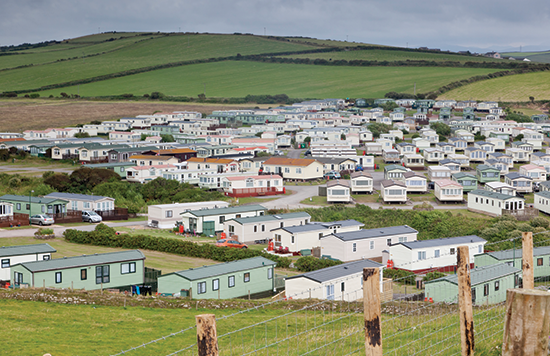
The History of Mobile Home Parks in America
During World War II, the U.S. government distributed 35,000 trailers across 8500 parks to temporarily accommodate workers in defense plants and other war-related industries. Then, during the post-war housing shortage, their numbers continued to grow. Their convenience was undeniable: To turn a trailer into a home, all you needed to do was hook it up to the necessary utilities.
However, as ‘stick-built’ homes became more numerous and affordable for middle-class Americans from the mid-1960s on, the trailer park’s reputation plummeted. As the stigma intensified, zoning laws were manipulated to push mobile homes further and further into the outskirts of American towns. As the inequality between socioeconomic classes widened in the 1980s, so did stereotypes about “trailer trash” in pop culture.
As Mobile Home Living explains:
“The trailer park served as a metaphor, a cultural marker of class difference during a decade when Americans were more inclined to ascribe poverty to moral failings than to class-based inequities.”
Today, an estimated 20 million Americans live in mobile home parks—and the vast majority are located in rural states. Whereas 1 in 6 West Virginians lives in a mobile home, New Englanders may never encounter a mobile home park.
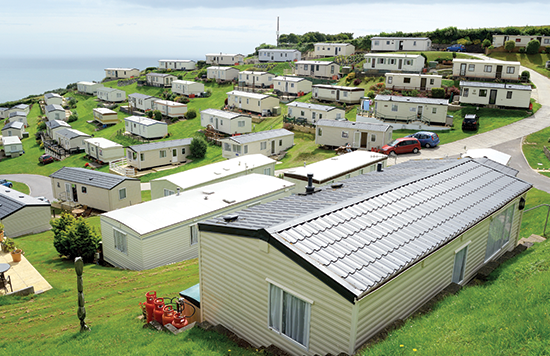
Why Mobile Homes Matter in Today’s Housing Market
To better understand the critical role that mobile homes play in today’s housing market, let’s take a look at the affordable housing crisis that the United States currently faces.
Although the economy continues to rebound from the recession, wages are simply not rising as quickly as rent costs and home prices. 4 in 10 American workers make less than $20,000 each year, while the poverty line is $24,300 for a family of four. 1 in 4 employed renters spends 50% or more of their income on rent. Meanwhile, public housing shrank by 211,000 units between 1995 and 2012—and only 1 in 4 Americans who qualifies for housing assistance actually receives it.
In 2016, the national median rent for a one-bedroom apartment was $1234. Minimum wage workers can’t afford a two-bedroom apartment in any state in the U.S. without being ‘cost-burdened’: spending more than 30% of their income on housing. At the federal minimum wage of $7.25, they would need to work 117 hours a week, 52 weeks of the year to afford the average 2-bedroom apartment—or 94.5 hours for a 1-bedroom.
Owning a home can be cheaper than renting, but the number of starter homes on the market has decreased by 44% over the last 5 years. The average buyer now needs to spend 37% of their income on housing to afford a starter home.
This is why mobile home is attractive to so many: For less than $1000 a month—sometimes as low as $200, if you own an older mobile home—a family can have a roof over their head with a built-in community. It’s not most people’s first choice—but it remains a critical part of American housing market for millions of low-wage workers.
As one senior resident explains in a recent TIME article:
“Nobody says, ‘I’m going to retire to Florida and live in a trailer park.’ They say, ‘I’m going to move to Florida and play golf, go to the beach, enjoy life.’ The trailer? The trailer is what makes everything else possible.”
Read it on the #BuildiumBlog: The definitive guide to investing in mobile home parks! Share on X
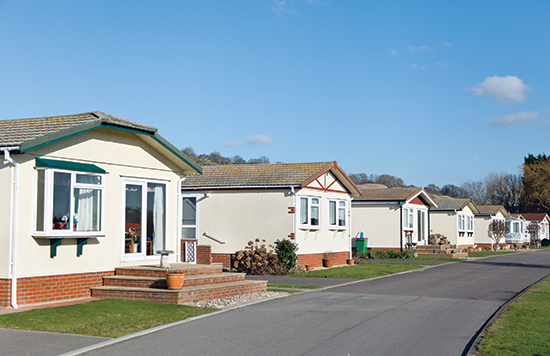
Who Owns Mobile Home Parks—and What’s the Opportunity for Investors?
There are approximately 50,000 mobile home parks across the United States. Only 1 in 5 are professionally managed. The vast majority are owned by “mom and pop” operators—many of whom are on the road to retirement. This presents a prime opportunity for investors, who can buy these mobile home parks directly from retiring owners for a low price—and often through seller financing, without the need to go through a bank.
Existing mobile home parks are shuttering at a rate of 1% each year—and restrictive zoning laws make it nearly impossible to build a new park anywhere in the country. This means that the supply of mobile homes is actually decreasing, which increases the value of existing parks. In addition, the stigma surrounding “trailer parks” means that investing in mobile home parks isn’t yet as competitive as other areas of real estate.
Meanwhile, a portion of people will always struggle to afford housing. If the economy gets stronger, home prices go up, making it harder for low-wage workers to afford housing; and if the economy takes a downturn, even more people need access to affordable housing. This means that mobile homes—the ultimate affordable housing, since they can be mass-produced in factories—tend to retain their value regardless of the economy.
Mobile home parks: What's the opportunity for investors? Find out on the #BuildiumBlog now! Share on X
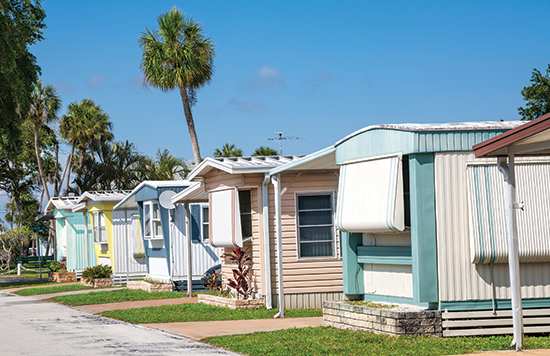
How Investing in Mobile Home Parks Works—and Why It’s So Lucrative
There’s a simple, three-step process for investors to assume the operations of a mobile home park: They fix up the park; hire a park manager to run the day-to-day operations; and collect rent on the land.
Fixing Up the Park
The first thing to understand about investing in mobile home parks is that you generally own the land the trailers reside on—not the trailers themselves. Around 80% of residents own their mobile homes (or make payments to a third party) and only pay rent on their lots. The other 20% of residents purchase a used trailer from the park owner and pay rent on their home as well as on the lot.
Because the lots belong to park owners —not the mobile homes—investing in mobile home parks has a lower cost per unit than any other type of real estate. This allows park owners to own more units for the same investment, spreading out the risk and making the cash flow more consistent.
Any upgrades that a park owner makes increases each mobile home’s rental potential—without having to invest directly in any individual unit. A new owner will want to invest in the park’s appearance—for example, bringing in a landscaper, replacing outdated signage, and encouraging residents to clean up their yards. The only maintenance a park owner is responsible for relates to common amenities like water, electricity, roads, and sewers. However, you may want to consider upgrading aging infrastructure or adding amenities if it makes financial sense, as these can have a huge impact on the park’s value and the residents it attracts.
Another factor that makes property improvements go farther in mobile home parks is that they depreciate on an accelerated schedule. Land improvements like updates to roads and utility connections depreciate over a period of 15 years—nearly 2 times faster than apartment buildings (27.5 years), and 2.5 times faster than commercial properties (39 years). This can translate to tax-free operating cash flows for many mobile home park investors.
Hiring a Park Manager
After the initial work has been done, mobile home park investors can delegate all day-to-day responsibilities to a park manager. A mobile home park manager is essentially an on-site property manager: They collect rent, keep units occupied, coordinate park maintenance and landscaping, and resolve issues with residents and shared utilities. This makes it easy to manage mobile home parks from a distance.
Park managers generally live in a rent-free mobile home on the property so they’re available to other residents at all hours. In fact, many park managers start out as upstanding residents—after all, who is more qualified to resolve a community’s issues than someone who’s lived there for years? Along with receiving free housing, park managers may also get paid a salary; this often depends on the size of the park and the number of hours they’re needed.
In addition to a park manager, larger mobile home parks may require an assistant park manager (to take over whenever the full-time park manager is unavailable), a maintenance worker, and a landscaper.
Keep in mind, however, that your mobile home park’s staff isn’t responsible for any issues with the mobile homes themselves. Leaky roofs, glitchy wiring, aging appliances—they’re up to residents to resolve. The same principle applies to landscaping: Your staff only needs to mow the lawns in common areas, not in residents’ yards. (Your rental agreements and community rules should make this abundantly clear.)
Read it on the #BuildiumBlog: 8 smart tips for investing in mobile home parks! Share on X
Collecting Rent
Once the park has been acquired, initial improvements have been made, and day-to-day operations have been delegated to on-site staff, the investor’s focus can shift to revenue generation.
In addition to the reasons we’ve already discussed, there are three additional reasons why investing in mobile home parks can be so lucrative. First, capitalization rates (net income divided by purchase price) are 1 to 3 percentage points higher than for multifamily properties, resulting in more immediate cash flow returns. Second, mobile home parks have lower operating expenses than apartment buildings—operating at an estimated 30% margin, compared with 50% for apartment buildings.
The third reason why mobile home parks are great for investors has to do with rent prices—but this is a more complicated matter than it may seem on the surface. Let’s dig into this issue.
Setting Rent Prices
In a standard housing arrangement, rent costs are a negotiation between landlords and tenants. If property owners set the rent too high (or raise it too quickly), they’ll struggle to keep their units occupied. Existing tenants won’t renew their leases, and prospective tenants won’t sign them in the first place.
However, unlike those who live in apartments, many mobile home residents can’t move out—enabling park owners to set rents as high as they’d like, with few consequences.
Why is this? Well, mobile homes aren’t really all that mobile. Moving a mobile home costs thousands of dollars—between $3000 and $6000 for a single-wide trailer, and up to $10,000 for a double-wide. The millions of Americans living paycheck to paycheck may not have any money saved—particularly seniors living on fixed incomes. When a park owner raises rents, then, most mobile home occupants have no choice but to bite the bullet, lest the land be pulled out from underneath them.
Consequently, it’s critical that investors never lose sight of the fact that living in a mobile home park is rarely a resident’s first choice. For many mobile home residents, it’s one step removed from living in their car or on the street. The knowledge that you can increase rent whenever you like should always be balanced by the knowledge that your residents are held captive by their financial situation.
Investing in mobile home parks gives you a unique opportunity to make the community a better place to live and turn a significant profit—so make sure that you keep your residents in mind as you make investment decisions.
How can mobile home park investors turn a profit without doing so at the expense of your residents’ well-being? It’s actually a simple equation: Find the average price of a comparable apartment in your area, then divide it by two—that’s the maximum rent that you should charge. A single-wide trailer might be comparable to a one-bedroom apartment, and a double-wide is probably most like a two-bedroom. This equation accounts for the cost of living in your area; and dividing by two accounts for the fact that you’re only renting the lot, not the unit, too. You’ll know that it’s time to charge more when the average apartment rent in your area begins to rise.
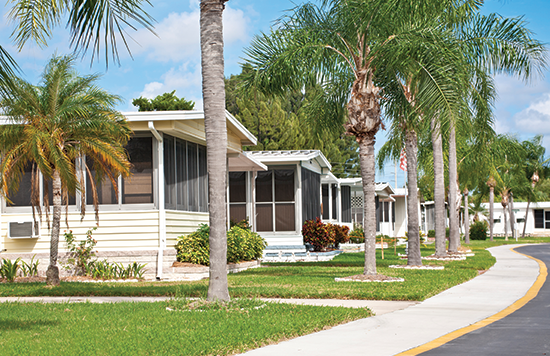
8 Smart Tips for Investing in Mobile Home Parks
1. Don’t invest in areas where housing is already cheap. If people could afford to rent apartments or buy houses, they wouldn’t live in mobile home parks.
2. Examine 5 things before investing in a mobile home park, according to U.S. News’ The Smarter Investor: The park’s infrastructure, its income history, its location, park-owned trailers’ age and condition, and local laws on maximum density per acre.
3. Talk to 3 groups of people before investing in a mobile home park: The park’s current staff, the current owners, and the local police. Between these 3 parties, you’ll learn everything you need to know about the park’s history, operations, infrastructure, and residents.
4. Prioritize updates to critical infrastructure first: Roads and utility connections (like water, sewer, electric, and gas). It’s better to do preventative maintenance right off the bat than fix expensive emergencies later.
5. Evaluate the condition of all park-owned homes next: Is it more cost-effective to repair or replace each one? Be sure to inspect park-owned mobile homes regularly (we recommend once per quarter) and perform preventative maintenance.
6. Follow a set protocol with every staff member you hire. According to park management expert Andy Tallone: Run background checks and call their references. Always have them sign a contract. Put them on your payroll and provide unemployment insurance and workers’ compensation. Watch out for embezzlement, as with all small businesses.
7. Try to build water costs into your rent. This tends to be mobile home park owners’ biggest expense. Start by dividing the total amount you pay for utilities each month by the number of lots you rent out; then figure out if you can distribute this cost across your residents without raising rents too high.
8. Don’t let the industry jade you: Housing is a right, not a privilege; and unlike the stereotypes, mobile home park residents are just like everyone else: They need a safe, affordable place to call home. Screen your residents before you let them move in, and always look out for your current residents’ safety and well-being. Always do your best to balance your desire to turn a profit with your residents’ need for an affordable place to live.
Is investing in mobile home parks the next big thing in real estate? Find out on the #BuildiumBlog! Share on X
To learn more about mobile home park investing, be sure to listen to this podcast episode: Mobile Home Park Investing and Property Management Podcast. In the podcast, Buildium founder Michael Monteiro discusses the opportunity that mobile home parks present for property managers, and how property management software like Buildium can support your success.
Read more on Growth

